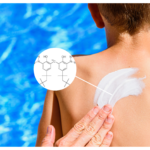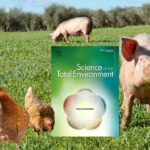
MBBT or “Bisoctrizole” in nano form

By the AVICENN team – Last updated November 2020
Nano MBBT
Methylene bis-benzotriazolyl tetramethylbutylphenol (MBBT), otherwise known as “Bisoctrizole” (CAS number: 103597-45-1), is a UV filter authorized in nano form at the European level within the framework of the Cosmetics Regulation at a concentration of 10 % m/m (except for applications that may result in end-user lung exposure through inhalation of this substance). It is used in the BASF product Tinosorb®1MCf. BASF welcomes EU approval of nano-sized UV filter in cosmetics, BASF, July 30, 2018.
According to the Ministry of Ecological Transition and Solidarity2Cf. bilan R-nano 2019, Ministry of Ecological Transition and Solidarity, June 2020, between 10 and 100 tons of nano MBBT were officially imported or manufactured in France in 2018. This range is not very precise and should be considered as an indication only because the quantities registered in the French R-nano register are below the quantities actually present on the French market, as many nanomaterials escape declaration.
There are strong uncertainties about the risks associated with MBBT, which is insoluble and persistent/bioaccumulative, leading the European Scientific Committee on Consumer Safety (SCCS) to place nano MBBT at the top of the list of riskiest nanomaterials in the cosmetics sector in October 2020.
Any questions or comments? This information sheet compiled by AVICENN is intended to be completed and updated. Please feel free to contribute.
Other news on the topic
Our information sheets to go further
Upcoming Nano Agenda
- Introductory seminar on the principles of Life Cycle Assessment (LCA) and its specificities when applied to nanomaterials (metal nanoparticles, oxides, etc.), from their production to their end-of-life.
- Organizer: NaMasTE research group (Manufactured Nanomaterials, Toxicology, Ecotoxicology and Risks: Towards Controlled Development)
- Speaker: Gaetana (Tania) Quaranta, Senior Lecturer, University of Strasbourg – IPHC
- Website: https://gdr-namaste.cnrs.fr/

- Webconference for analysis laboratories, plant fertilizer manufacturers and distributors, public authorities…
- Moderated by David Krupka, nanotechnologies development manager at AFNOR Normalisation and Emilie Langlois-Bertrand, nantechnologies standardization project manager.
- In partnership with Armand Masion (CEREGE) and Patrice Charpentier (ANSES).
- This exchange will also be an opportunity to explore the creation of a national platform to identify standardization needs.
- Website: https://www.afnor.org/evenements/qualite/nanotechnologies-agriculture-cadre-pratique-responsable

- International conference on metallic nano-objects for experts working in the interdisciplinary field of metallic nanoparticles, with a particular emphasis on nanoparticle synthesis and characterization, plasmonics, optics and photonics, catalysis, biomedicine, electronics, and nanoparticle recycling
- Organizers / Partners: CNRS, Bordeaux University, Bordeaux INP, ICMCB, CRPP, CBMN, ISM
- Website: https://mno2026.sciencesconf.org
File initially created in November 2020
Notes and references
- 1MCf. BASF welcomes EU approval of nano-sized UV filter in cosmetics, BASF, July 30, 2018
- 2Cf. bilan R-nano 2019, Ministry of Ecological Transition and Solidarity, June 2020



